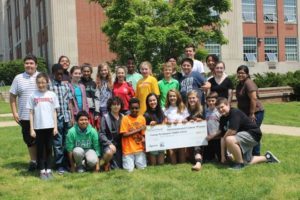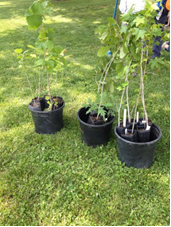2014 Alexandria, Virginia, USA

Seventh grade science students at George Washington Middle School tested water quality in local streams, and their results showed low dissolved oxygen, which is a threat to aquatic life. In the Chesapeake Bay, depletion of dissolved oxygen leads to extensive “dead zones” where important native species, like oysters, cannot survive. They worked with the city’s former Watershed Program Administrator and the Virginia Cooperative Extension to develop their solution to one of the causes for low dissolved oxygen. In Alexandria, storm water heats up on streets and other impervious surfaces, and the problem has worsened with loss of tree canopy to shade and cool the landscape. Improve their watershed. Their grant idea was based on the idea of planting trees along the Potomac River.
As Caring for Our Watersheds finalists, the students presented their proposal to plant trees to help  reduce the temperature of stormwater runoff, and they demonstrated additional ecosystem benefits of trees using the UDSA Forest Service’s iTree software suite. Their Dissolved Oxygen Project was the winner of the 2014 Caring for Our Watersheds contest in Virginia.
reduce the temperature of stormwater runoff, and they demonstrated additional ecosystem benefits of trees using the UDSA Forest Service’s iTree software suite. Their Dissolved Oxygen Project was the winner of the 2014 Caring for Our Watersheds contest in Virginia.
With tree saplings donated by a local native plant nursery, Earth Sangha, they planted 14 trees at the school, and as the location was far from a water source, they requested and received $840 in implementation funding from Nutrien to cover a watering truck contract to keep the trees alive through the hot, dry summer. They also performed a rap to raise awareness of the importance of tree planting onstage at Alexandria’s Earth Day celebration at Ben Brenman Park.